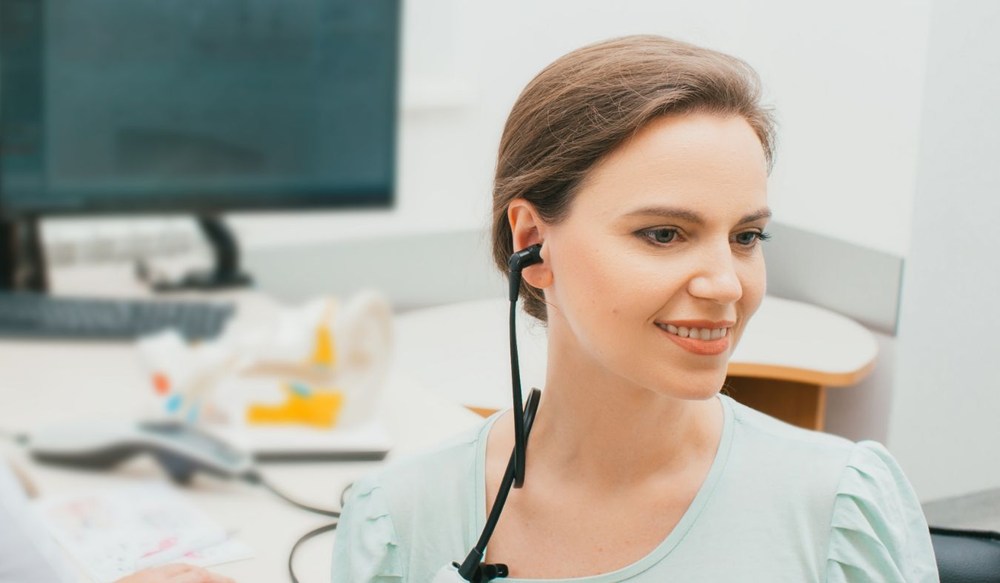The Impact of Hearing Tests on Quality of Life
We’re pretty good about scheduling annual physicals, dental

By: admin | August 21, 2025
When summer arrives and temperatures climb, it is easy to forget how heat and humidity can affect your hearing aids. These devices are built to support your hearing every day, but warm weather can sometimes interfere with their performance and shorten their lifespan. Sweat, moisture and direct sunlight are just a few factors that can impact how well your hearing aids work during the summer months.
The good news is that protecting your hearing aids during summer doesn’t require major changes to your routine or avoiding the activities you enjoy. With some basic awareness about how heat affects these devices and simple preventive steps, you can keep your hearing aids functioning properly throughout the warmest months of the year. Understanding what situations pose the biggest risks and having practical strategies ready can help you enjoy outdoor activities, travel and summer events, and live in a humid area like Tampa without worrying about damaging your devices.
High temperatures can affect the internal parts and battery life of your hearing aids. When exposed to heat, these devices may not work as well or could even shut down without warning. Prolonged exposure can also shorten the overall lifespan of delicate electronics, meaning professional hearing aid repairs or replacements may be needed sooner than expected.
Common problems caused by heat include faster battery drain, distorted sound, moisture buildup inside the device and warping or cracking of plastic parts. Even accessories, like charging cases, can be damaged if left in hot cars or direct sunlight for too long. Sweat and humidity during summer months can make the problem worse, since moisture can seep into microphones and speakers, reducing sound clarity.
Leaving your hearing aids in direct sunlight can lead to serious problems, especially during the hottest parts of the day. Sunlight can quickly raise the temperature inside your devices, damaging sensitive electronics and plastic parts.
Overheating can also cause batteries to drain faster or leak, leading to more repairs or replacements. Sunlight may also discolor or warp the outer shell, making your devices less comfortable. Protecting your hearing aids from direct sun helps them last longer and work as they should.
Summer weather creates conditions that make hearing aids more vulnerable to moisture buildup. Heat increases sweating, and higher humidity levels slow down the evaporation process, leaving moisture trapped inside the devices. Even everyday activities like exercising outdoors or moving between air conditioning and hot outdoor air can cause condensation to form. These factors make it more difficult to keep hearing aids completely dry during the warmer months.
Moisture can come from a variety of sources. Sweat from physical activity, damp air on muggy or rainy days, and sudden temperature changes all contribute to moisture collecting inside the devices. Over time, this extra exposure to moisture can weaken internal parts and increase the risk of performance issues. Recognizing how these conditions occur helps explain why hearing aids often face more challenges in the summer compared to cooler seasons.
When moisture seeps into a hearing aid, it can affect both sound quality and reliability. Batteries may drain more quickly, microphones or speakers may become blocked and corrosion of small metal parts can lead to long-term damage. Some devices may even shut down unexpectedly when exposed to excess sweat or humidity. Knowing these risks highlights why consistent care, like drying the devices overnight and avoiding unnecessary exposure to damp conditions, is so important during hot and humid weather.
If your hearing aid gets wet, quick action can make the difference between a temporary setback and lasting damage. The first step is to gently dry the outside of the device with a soft, clean cloth. Remove the battery right away if your hearing aid uses one, since moisture inside the battery compartment can cause corrosion. Leave the compartment open and let it air out. For rechargeable devices, place them in their charging case only after you are sure they are fully dry on the outside.
To remove lingering moisture, a hearing aid dryer or dehumidifier is the best tool. These devices are designed to safely draw out humidity without harming sensitive components. Avoid using hairdryers, ovens, or microwaves, as high heat can permanently damage your hearing aids. If your hearing aid is not working properly after it has dried, it may need professional attention.
You may notice changes in your hearing aids when the weather is hot, and these changes can often serve as warning signs. Muffled sound, strange noises or devices shutting off without reason are some of the most common indicators that heat or moisture may be interfering with performance. Even small issues like sound cutting in and out should not be ignored, as they can signal that the device is struggling under the stress of summer conditions.
In some cases, you may also see condensation forming inside the battery door or notice that your hearing aid feels warmer than usual when you touch it. Excessive warmth can strain the internal components, while trapped moisture can cause corrosion over time. These problems may not appear immediately but can build up, leading to more frequent malfunctions or a gradual decline in sound quality.
Storing your hearing aids in a cool, dry place is one of the simplest yet most effective ways to protect them during the summer. Heat and humidity can quickly build up, whether you are outside in the sun, exercising or even sitting in a warm room. Keeping your devices away from direct sunlight, car dashboards or bathrooms helps reduce the chance of moisture collecting inside and damaging the delicate parts.
When you are not wearing your hearing aids, placing them in a hard case gives them protection from accidental drops, dirt or exposure to damp air. For added protection, many people find that a drying box or dehumidifier is especially helpful during the summer months. These devices gently remove trapped moisture, keeping your hearing aids cleaner and more reliable over time.
If you travel often or spend time outdoors, making storage a regular habit can save you from unnecessary repairs. A secure case or drying kit not only protects against heat and humidity but also makes it easier to keep track of your devices when you are on the go. Simple storage routines can go a long way in keeping your hearing aids ready to perform when you need them most.
When the weather gets hot, the right accessories can help you stay comfortable while also protecting your hearing aids. Choosing lightweight, breathable gear reduces the chance of overheating and limits the impact of sweat or moisture on your devices. These small adjustments make summer activities easier to enjoy without worrying about how the heat might affect your hearing aids.
High temperatures can cause batteries in hearing aids to drain faster or leak. Always store spare batteries in a cool, dry place instead of leaving them in a hot car or direct sunlight. Rechargeable batteries often handle temperature changes better than disposable ones.
Check battery levels more often during hot weather so you do not get caught with a dead device while out. Replace batteries at the first sign of trouble to prevent unexpected shut-offs and keep your hearing aids working reliably all summer.
Cleaning your hearing aids each day is one of the best ways to prevent sweat, dirt and moisture from causing problems during hot weather. Even small amounts of buildup can block sound, shorten battery life or make your devices less comfortable to wear.
A soft, dry cloth is usually enough to wipe away sweat or oils from the outside of your hearing aids. For stubborn dirt, a cleaning brush or tool made for hearing aids can gently clear away debris without scratching or damaging the surface. Openings like the microphone ports and receiver should be cleaned carefully to avoid clogs that can distort sound.
For behind-the-ear styles, be sure to check the tubing and earmold. These parts can collect condensation in humid weather, which may need to be cleared with an air blower or tubing tool. In-the-ear styles often trap more wax, so wax guards or filters should be checked and replaced as needed. Rechargeable models may also need extra attention around the charging contacts to ensure they stay free of sweat or grime.
Some people find it helpful to use a hearing aid drying box or dehumidifier at night during the summer. This adds another layer of protection by removing moisture that a cloth alone may not reach. No matter which style you use, a consistent cleaning routine keeps your hearing aids working their best and helps prevent small issues from becoming bigger repairs.
Warm weather and increased activity can sometimes cause hearing aids to behave differently. If you notice signs like muffled sound, intermittent beeping, devices turning off unexpectedly or unusual condensation inside the battery compartment, it may be time to contact your audiologist. These issues can indicate that heat or moisture has affected your hearing aids, and addressing them early can prevent more serious damage or performance problems.
You should also reach out if you experience discomfort from sweat or irritation around your ears, or if you notice corrosion or damage to metal parts. Even minor changes in sound quality, battery performance or fit can signal that your devices need professional attention. Regular check-ins during the summer months can help your audiologist identify potential problems before they become serious, keeping your hearing aids working effectively throughout the season.
Keeping your hearing aids in top condition during the summer comes down to a few consistent habits. Watching for signs of heat or moisture, storing your devices in cool, dry places and using protective accessories can prevent common problems. Regular cleaning and careful handling ensure that sweat, dirt or humidity doesn’t interfere with performance. With these small steps, you can continue to enjoy your favorite summer activities while your hearing aids stay comfortable and reliable.
If you notice changes in how your hearing aids function, we can help. You can reach out to us for guidance, maintenance or tips for keeping your hearing aids working well during hot weather. We at Tampa Audiology Solutions in Tampa, FL are here to make sure you get the most from your devices all season long. Contact us at (656) 333-6686 and let us support you in keeping your hearing aids performing their best.
Tags: hearing aid basics, hearing aid repair, hearing aid styles

We’re pretty good about scheduling annual physicals, dental
By: admin | December 21, 2025

When summer arrives and temperatures climb, it is easy to forget how heat
By: admin | August 21, 2025

Every day in Tampa brings its own set of sounds and experiences. Whether
By: admin | May 16, 2025
